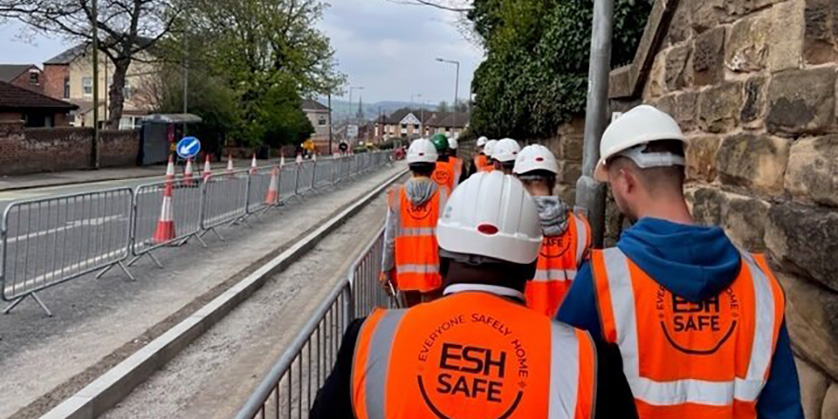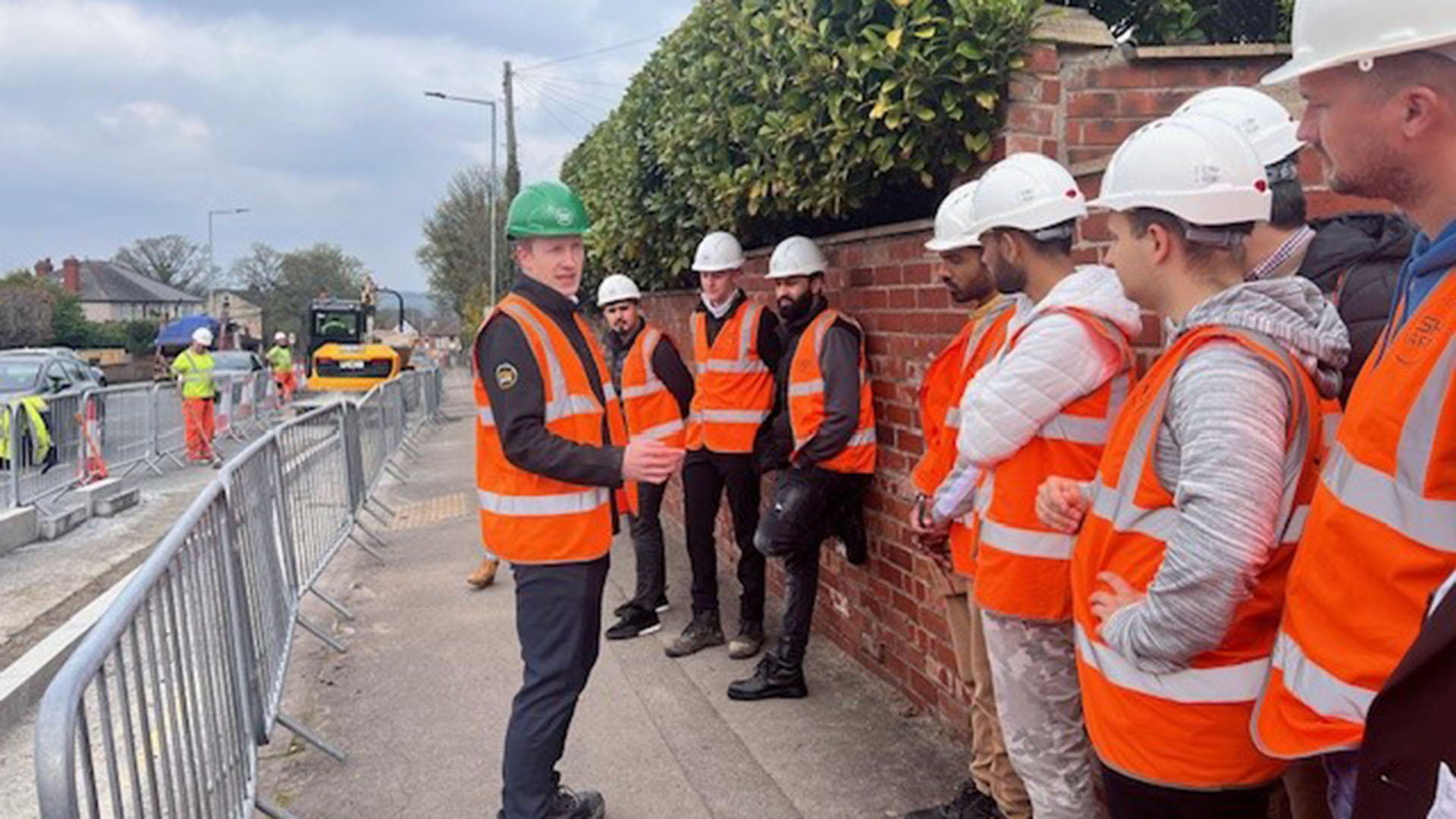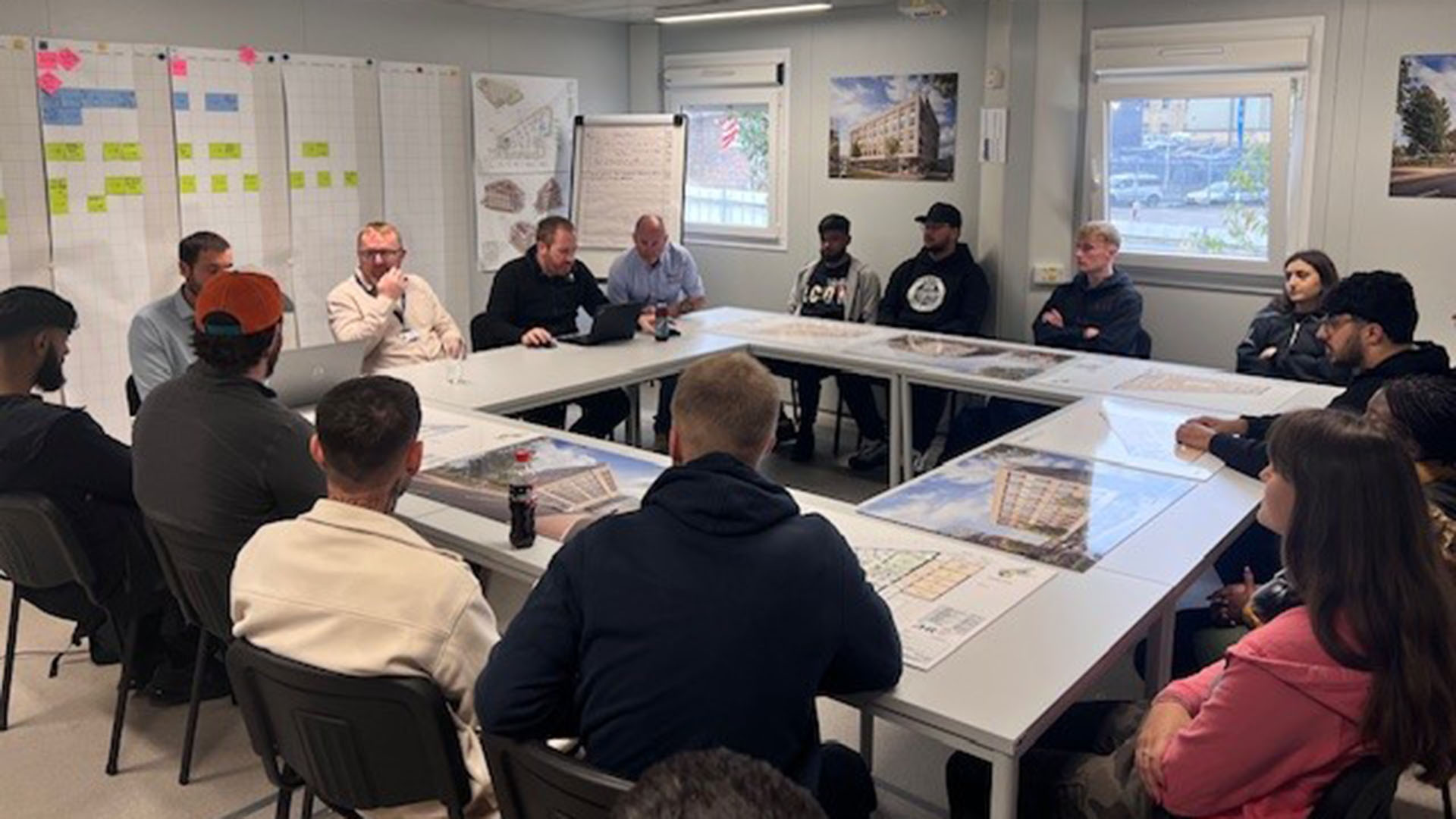
Quantity Surveying BSc(Hons)
Start Dates
21 September 2026
Duration
3 years full-time 4 years inc. placement year
UCAS Tariff
112-104
Overview
Why choose Huddersfield for this course?
- Opportunities to collaborate with students from other Built Environment courses, mirroring professional practice and helping you develop essential ski
- Top in Yorkshire for student experience and top 10 in the UK for teaching (NSS 2025).
- Gain skills in digital tools, BIM, and innovative methods to balance cost, quality, and sustainability while meeting client and industry needs.
Accreditation and Professional Links
Recognised connections to give you an extra edge when you graduate. Read More
If you’re analytical, enjoy problem-solving, and want to play a vital role in managing costs, budgets, and contracts throughout the construction project lifecycle, our BSc (Hons) Quantity Surveying course could be the start of a rewarding career.
Accredited by the Royal Institute of Chartered Surveyors (RICS) and the Chartered Institute of Building (CIOB), this degree gives you the knowledge and professional grounding to become a chartered quantity surveyor. You’ll learn how to manage project costs, contracts and resources — from initial concept to final completion — helping to deliver sustainable buildings and infrastructure that serve people and communities.
You’ll study alongside students from Architecture, Architectural Technology, Building Surveying, and Construction Project Management, gaining insight into how multidisciplinary teams work together on real projects. This collaboration mirrors professional practice and helps you develop strong teamworking, communication, negotiation, and leadership skills.
You’ll also explore how digital tools and innovative methods are transforming the industry. Building Information Modelling (BIM) and Lean Construction are key parts of your learning, giving you the skills to plan, budget and manage projects efficiently while reducing waste and improving value.
Our facilities in the Barbara Hepworth Building are exceptional — and so is the access and support you’ll receive to make the most of them. You’ll be taught and guided by experienced professionals who understand what it takes to succeed in today’s construction industry.
In the National Student Survey 2025, Building is ranked top in Yorkshire for learning opportunities, assessment and feedback, academic support, learning resources and organisation and management — and top 10 in the UK for teaching on my course and student voice.
By the time you graduate, you’ll have the skills, confidence and professional credibility to take your next steps towards chartered status and a successful career.
Career opportunities after the course *
Quantity Surveyor
Estimator
Mechanical Estimator
Project Manager
Electrical Estimator
*Lightcast
Entry Requirements
BBC-BCC at A Level or equivalent.
112-104 UCAS tariff points from a combination of Level 3 qualifications.
Merit at T Level.
DMM-MMM in BTEC Level 3 Extended Diploma.
Merit in UAL Level 3 Extended Diploma.
Merit in RSL Level 3 Extended Diploma.
Access to Higher Education Diploma with 45 Level 3 credits at Merit or above
112-104 UCAS tariff points from International Baccalaureate qualifications.
If your first language is not English, you will need to meet the minimum requirements of an English Language qualification. The minimum for IELTS 6.0 overall with no element lower than 5.5, or equivalent. Read more about the University’s entry requirements for students outside of the UK on our International Entry Requirements page.
If you do not have the appropriate qualifications for direct entry to this degree you may be able to apply to our Engineering Foundation Year.
Other suitable experience or qualifications will be considered. For further information please see the University's minimum entry requirements.
Course Details
Teaching and Assessment
Discover what to expect from your tutor contact time, assessment methods, and feedback process.
Global Professional Award
At Huddersfield, you’ll study the award-winning Global Professional Award (GPA) alongside your degree* — so you’re ready for the career you want, whatever subject you choose.
Placements
The course offers an optional one-year (36 week minimum) work placement after the second year. This will give you the opportunity to gain valuable hands-on experience, insight into your chosen career and open up your graduate employment prospects. Our Placement Unit and academic staff have excellent industry links and can support you in applying for and finding your placement(s), as well as during your placement year.
I felt like Kier gave me the greatest opportunity to get involved with a major project and gain the greatest experience possible. The placement year has solidified my interest in being a Quantity Surveyor and will help me get a graduate job.
- Hollie Birks
Quantity Surveying BA(Hons)
Your Career
The course aims to help you to develop the necessary skills leading to be a professionally qualified Chartered Quantity Surveyor. As a graduate you could consider a career as a quantity surveyor, possibly through first working as an assistant.
85%
Percent of graduates from this subject area were in work or further study 15 months after graduation
* HESA Graduate Outcomes 22/23, UK Domiciled
Fees and Finance
This information is for Home students applying to study at the University of Huddersfield in the academic year 2026/27.
Please note that tuition fees for subsequent years may rise in line with inflation (RPI-X) and/or Government policy.
From January 2027 the UK government is launching a new student funding system for people starting university education. Read more about the Lifelong Learning Entitlement (LLE).
For detailed information please visit https://www.hud.ac.uk/study/fees/
This information is for international students applying to study at the University of Huddersfield in the academic year 2026/27.
Please note that tuition fees for subsequent years may rise in line with inflation (RPI-X) and/or Government policy.
For detailed information please visit https://www.hud.ac.uk/international/fees-and-funding/
Home
The tuition fee for a placement year is £1000. If you go on work experience or work placement, you will need to fund your own travel and/or accommodation costs to and from the placement. Please be aware that if your placement is outside of the UK, you will still be responsible for your travel and living expenses and may need to consider issues like health care and insurance costs.
International
The tuition fee for a placement year is £3,300. If you go on work experience or work placement, you will need to fund your own travel and/or accommodation costs to and from the placement. Please be aware that if your placement is outside of the UK, you will still be responsible for your travel and living expenses and may need to consider issues like health care and insurance costs.
Scholarships and Bursaries
Discover what additional help you may be eligible for to support your University studies.
Tuition Fee Loans
Find out more about tuition fee loans available to eligible undergraduate students.
What’s included in your fee?
We want you to understand exactly what your fees will cover and what additional costs you may need to budget for when you decide to become a student with us.
If you have any questions about Fees and Finance, please email the Student Finance Team.
Gallery
See below for a glimpse at some of our facilities
Explore More
Why Hud
Explore the unique opportunities and resources that make our institution a top choice for students seeking a well-rounded and future-focused education.
More Info
Careers support
We know you’re coming to university to study on your chosen subject, meet new people and broaden your horizons. However, we also help you to focus on life after you have graduated to ensure that your hard work pays off and you achieve your ambition.
Find out more about careers supportStudent support
At the University of Huddersfield, you’ll find support networks and services to help you get ahead in your studies and social life. Whether you study at undergraduate or postgraduate level, you’ll soon discover that you’re never far away from our dedicated staff and resources to help you to navigate through your personal student journey.
See our support servicesTeaching Excellence
Great teaching is engaging and inspiring — it helps you reach your full potential and prepares you for the future. We don’t just teach well — we excel — and we have the awards and recognition to prove it.
Find out moreInspiring Academics
Our researchers carry out world-leading work that makes a real difference to people’s lives. Staff within the Department of Design and Architecture may teach you on this course.
Find out more about our staffResearch Excellence
You’ll be taught by staff who want to support your learning and share the latest knowledge and research.
Find out moreAccommodation
Looking for student accommodation? Huddersfield has you covered. HudLets has a variety of accommodation types to choose from, no matter what your preference. HudLets is the University’s approved accommodation service, run by Huddersfield Students’ Union.
Take a look at your optionsFurther Study
If you want to continue your learning beyond your undergraduate degree, there is a range of financial support available for postgraduate study, including discounts for Huddersfield graduates.
Discover postgraduate coursesLegal information
When you enrol as a student of the University, your study and time with us will be governed by our terms and conditions, Handbook of Regulations and associated policies. It is important that you familiarise yourself with these as you will be asked to agree to them when you join us as a student. You will find a guide to the key terms here, along with the Student Protection Plan.
Although we always try and ensure we deliver our courses as described, sometimes we may have to make changes for the following reasons:
Changes to a course you have applied for but are not yet enrolled on
If we propose to make a major change to a course that you are holding an offer for, then we will tell you as soon as possible so that you can decide whether to withdraw your application prior to enrolment. We may occasionally have to withdraw a course you have applied for or combine your programme with another programme if we consider this reasonably necessary to ensure a good student experience, for example if there are not enough applicants. Where this is the case we will notify you as soon as reasonably possible and if you are unhappy with the change we will discuss with you other suitable courses we can transfer your application to. If you do not wish to transfer to another course with us, you may cancel your application and we will refund you any deposits or fees you have paid to us.
Changes to your course after you enrol as a student
Changes to option modules
Where your course allows you to choose modules from a range of options, we will review these each year and change them to reflect the expertise of our staff, current trends in research and as a result of student feedback or demand for certain modules. We will always ensure that you have an equivalent range of options to that advertised for the course. We will let you know in good time the options available for you to choose for the following year.
Major changes
We will only make major changes to non-optional modules on a course if it is necessary for us to do so and provided such changes are reasonable. A major change is a change that substantially changes the outcomes, or a significant part of your course, such as the nature of the award or a substantial change to module content, teaching days (part time provision), type of delivery or assessment of the core curriculum. For example, it may be necessary to make a major change to reflect changes in the law or the requirements of the University’s regulators or a commissioning or accrediting body. We may also make changes to improve the course in response to student, examiners’ or other course evaluators’ feedback or to ensure you are being taught current best practice. Major changes may also be necessary because of circumstances outside our reasonable control, such as a key member of staff being unable to teach due to illness, where they have a particular specialism that can’t be adequately covered by other members of staff; or due to pandemics, other disasters (such as fire, flood or war) or changes made by the government.
Major changes would usually be made with effect from the next academic year, but may happen sooner in an emergency. We will notify you as soon as possible should we need to make a major change and will consult with affected groups of students and any changes would only be made in accordance with our regulations. If you reasonably believe that the proposed change will cause you detriment or hardship we will, if appropriate, work with you to try to reduce the adverse effect on you or find an appropriate solution. Where an appropriate solution cannot be found and you let us know before the change takes effect you can cancel your registration and withdraw from the University without liability to the University for any additional tuition fees. We will provide reasonable support to assist you with transferring to another university if you wish to do so and you may be eligible for an exit award depending on how far through your course you are.
In exceptional circumstances, we may, for reasons outside of our control, be forced to discontinue or suspend your course. Where this is the case, a formal exit strategy will be followed in accordance with the student protection plan.
The Office for Students (OfS) is the principal regulator for the University.



















